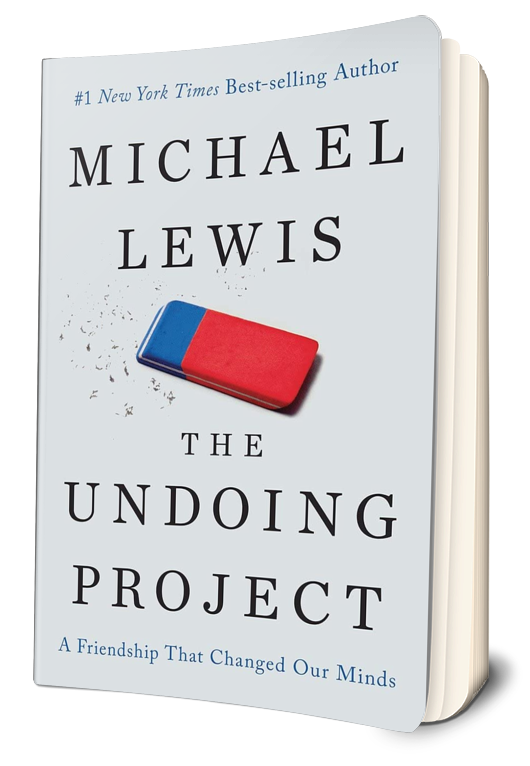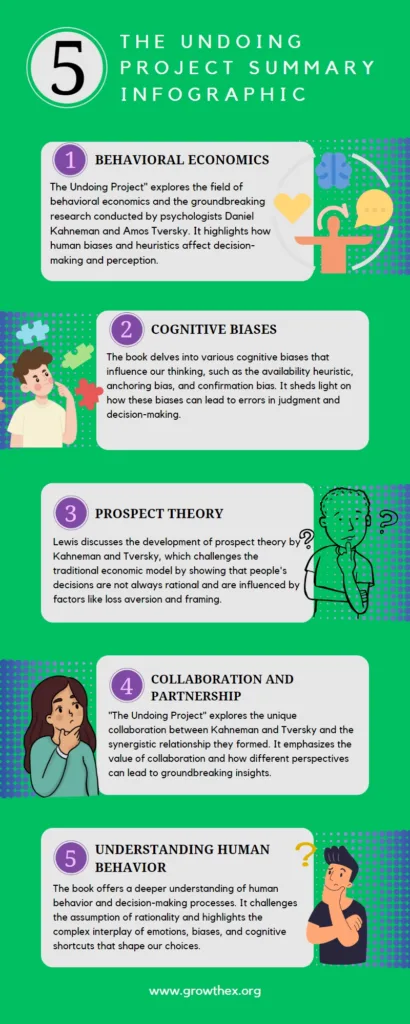The Undoing Project discusses the careers and extensive psychological studies of Kahneman and Tversky by highlighting some of their most important and ground-breaking findings about decision-making biases and human behavior.

Amos Tversky and Daniel Kahneman, two incredibly prominent psychologists, are profiled in the book The Undoing Project. When they learned that their study had ramifications for economics, medicine, law, politics, and other fields of human inquiry, the two were working together in Jerusalem.
Instead than just describing decisions, they wanted to know how people came to them. They set out to discover the causes of people’s mistakes in judgement as well as how these mistakes can be prevented.
The outcome was a fresh perspective on human decision-making that created numerous opportunities for more study. The book offers details about their early years, academic careers, interpersonal relationships, and personal lives.
Most of the time, humans make biased judgements.
In the book, Daniel Kahneman gives numerous examples of how heuristics can result in biassed or irrational behaviour, which are something we all occasionally experience but may not immediately recognise.
This is due to the fact that the majority of our choices are influenced by our past experiences, our worldviews, and other factors. In a way, it seems as though we never really make unbiased decisions but rather draw on the past.
People were generally believed to be rational beings who make sensible decisions up until the 1950s. To assist them in making moral judgements, they have institutions, laws, norms, customs, and other guidelines.
The concept of “cognitive bias” was coined by Kahneman and Amos, and it wasn’t until then that people began to take personal heuristics and how they can influence decision-making seriously. People begin life with a finite amount of time, knowledge, and few resources.
We are wired to behave in a way that makes sense to our brains because under these conditions, their decisions must be quick and ensure survival. Such factors can materially change an outcome’s fairness and objectivity during the decision-making process.
A strong relationship requires shared motivation, a shared goal, and a desire to achieve.
The classic that served as the cornerstone for contemporary psychology was written by Amos and Kahneman. Their research has an impact on a variety of fields, including behavioral psychology, sports, finance, and economics.
Not merely a single goal but also a shared desire to see the other succeed was what propelled them to their highest peaks. In fact, they tossed a coin to choose who’s name would appear first in the author’s box after the paper was finished.
Amos triumphed, but he conceded Kahneman the top slot. This demonstrates that their collaboration transcended beyond the workplace. They used the same typewriter to write everything, literally writing everything together. Their excellent teamwork was sparked by common interests and a true friendship.
They were able to make ground-breaking findings regarding the human mind as a result. Heuristics and biases that affect the decision-making process are a concept they developed. They also classified these biases, which helped modern psychology advance.
Some of the prejudices that the two psychologists uncovered permanently altered industry.
Kahneman and Amos collaborated to understand how heuristics and biases influence how people make decisions. For a variety of reasons, what they discovered transformed the world.
Industries like advertising, banking, and economics among many others understood how the mind functions and how to focus their efforts more effectively. Anyone who has learnt about these biases has improved their interactions with others and learned more about their own prejudices. Psychologists learned how to properly recognize and treat people.
In their study, some of the most prevalent prejudices were:
- The confirmation bias occurs when we seek for information that confirms our initial viewpoint and ignore that which runs counter to it.
- The recency bias states that because recent or significant events are easier to recall, we tend to believe them to be truer than any other conclusion our brains can reach.
- The anchoring bias causes us to place more weight on the initial piece of information we learn about a subject than on any subsequent information.
- We resist making plans for things that have never happened or are improbable to occur (such as an earthquake) because of cognitive dissonance.
The truth is that we don’t always act fully objectively when forming judgements and drawing conclusions about the world around us. Instead, our prejudices influence how we perceive the world and how we relate to others.
This isn’t always a terrible thing, though! In actuality, it plays a significant role in how we manage social situations. But you must be aware of your prejudices.
By being aware of them, you can choose to engage with people and make decisions about your surroundings more consciously.
The Undoing Project Book Review
Michael Lewis’ masterwork “The Undoing Project” explores the astonishing collaboration between psychologists Daniel Kahneman and Amos Tversky as well as their ground-breaking work in the discipline of behavioural economics. Lewis expertly combines their individual biographies with their scientific discoveries and the significant contributions they made to our understanding of human decision-making.
In this engrossing book, Lewis takes readers on a journey inside Kahneman and Tversky’s heads, examining their joint efforts to refute received knowledge and reveal the biases and heuristics that affect our decisions. Lewis vividly recounts their ground-breaking studies and meticulously details his study to shed light on the intricacies of the human mind.
Lewis’s talent for making difficult psychological concepts understandable to readers from various backgrounds is one of the book’s highlights. He skillfully combines scientific theory with personal tales to create a gripping narrative that holds readers’ attention from beginning to conclusion.
In addition to showcasing the genius of Kahneman and Tversky, “The Undoing Project” emphasizes the importance of their contributions to the development of economics, psychology, and public policy. It serves as a reminder of the significant influence that two people can have on our understanding as a whole.
Lewis, who is known for his storytelling talent, creates a book that is both thought-provoking and profoundly perceptive, challenging readers to examine their own cognitive biases and the complexities of human decision-making. For anyone interested in psychology, behavioral economics, or the fascinating interaction between the mind and decision-making processes, “The Undoing Project” is a must-read.

If you really like this “The undoing project book summary” by Growthex then you can also check out some more amazing posts | summaries which are freely available on this platform :